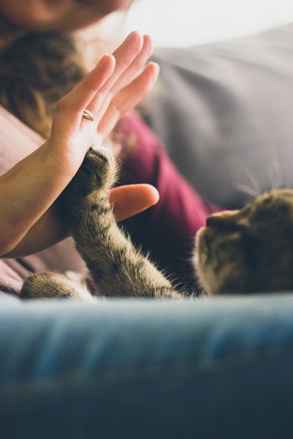 For many people, pets are an integral part of the family unit. The unconditional love they offer can lead to deeply rooted connections, which is why the idea of parting with them because of a divorce can feel so devastating. If you’re contemplating divorce in Portland, you may be wondering how ownership of your pet will be determined.
For many people, pets are an integral part of the family unit. The unconditional love they offer can lead to deeply rooted connections, which is why the idea of parting with them because of a divorce can feel so devastating. If you’re contemplating divorce in Portland, you may be wondering how ownership of your pet will be determined.
Oregon law does not view or treat pets similarly to children, and thus the process of ownership will not be treated like custody—rather, they are considered property. This means that, legally, pets are considered a possession much like your car, your couch, or that ceramic plate you love so much. While most pet owners would credit a much deeper value to their beloved animal than a ceramic plate, it’s important to understand how their legal consideration as property will affect the process of ownership.
In an ideal situation, you and your spouse would be able to come to terms of ownership within mediation. Since pets are treated as property and thus have monetary value, it is possible that one spouse may use the pet as leverage to get something else they would prefer (say, if I get the ceramic plate then you can have the dog). Regardless, mediation is a time to come to agreements without a judge.
With the help of your attorney and a mediator, you and your ex-spouse could amicably decide on the best home for your furry family member, or even create a type of “pet parenting plan”. While not legally supported and informal in nature, creating visitation agreements can be a viable option so long as both parties agree to uphold the terms. The beauty of mediation is that you and your spouse have the freedom to make a decision that can fit both of your needs without getting the court involved.
That being said, if an agreement is not made and the court needs to get involved in making a decision, they’ll do so on the basis of equitable distribution. Equitable distribution jurisdiction focuses on splitting marital assets fairly (and it should be noted, fair distribution does not equate to equal distribution). Below are a few factors the court may consider when deciding who should be awarded ownership of the pet:
- Who put the most effort towards acquiring the “item”, how long you’ve been married and future earning ability of both parties.
- If children are involved and the pet is a family animal, there’s a good chance the pet’s home will be the same as the kids.
- If you acquired the pet before your marriage that will likely factor in (if you have a purchase agreement for the animal that could also help).
- If your spouse is abusive to your pet and you can prove this to the court, they may consider this factor. While the best-interest of the pet won’t be considered in the same way a child’s interests would be when determining custody, anti-cruelty laws are nonetheless available and applicable.
It goes without saying that a divorce is difficult—throw in the added factor of deciding who gets to keep the family pet, and the burden of loss can feel overwhelming. If you’re facing this decision and fear the possibility of losing ownership of your animal, the attorneys at Pacific Cascade Legal can help explain this topic in further detail. We understand that pets are family and the emotional turmoil that can accompany this battle, and we are committed to ensuring that all of our client’s needs are heard and fought for. Call us today to set up at consultation at (503) 227-0200.



